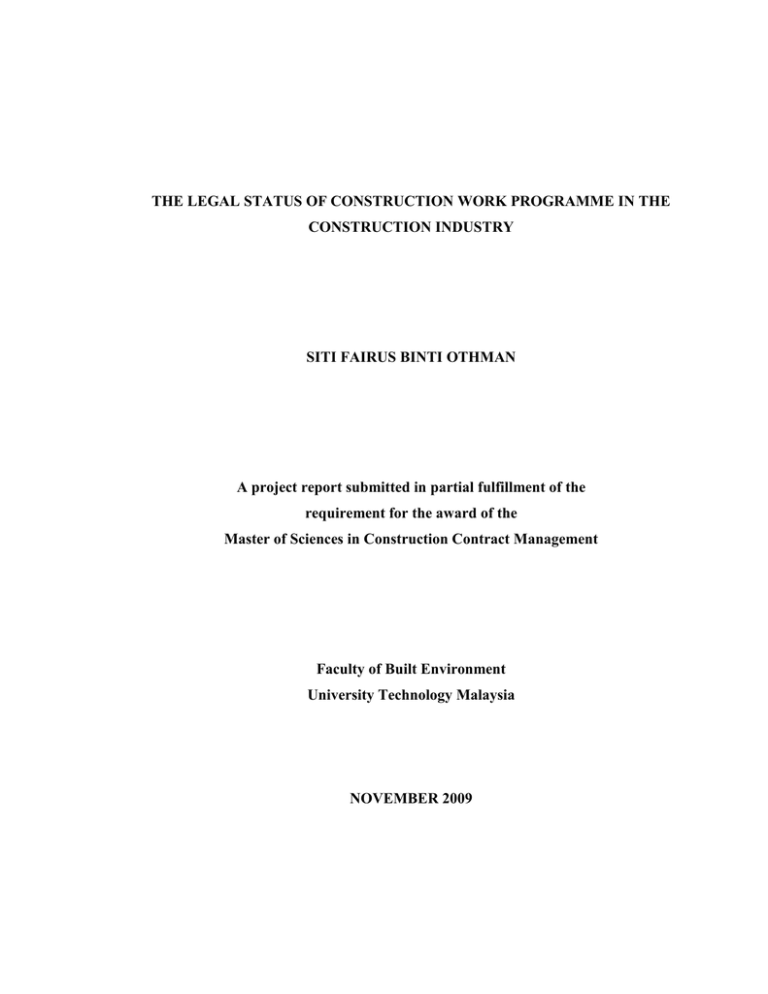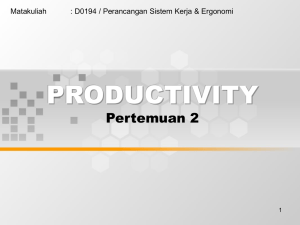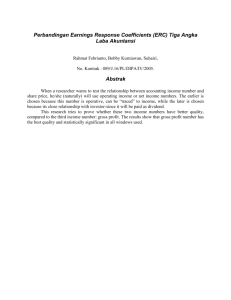THE LEGAL STATUS OF CONSTRUCTION WORK PROGRAMME IN THE CONSTRUCTION INDUSTRY
advertisement

THE LEGAL STATUS OF CONSTRUCTION WORK PROGRAMME IN THE CONSTRUCTION INDUSTRY SITI FAIRUS BINTI OTHMAN A project report submitted in partial fulfillment of the requirement for the award of the Master of Sciences in Construction Contract Management Faculty of Built Environment University Technology Malaysia NOVEMBER 2009 iii For my beloved Mother, Husband, Sisters, Brothers And Farya Nafeesa Thank you for your support, guidance and everything. iv ACKNOWLEDGEMENTS In the name of Allah most gracious most merciful A research of this nature may not be undertaken without help and support of others. They have contributed useful ideas towards my understanding and thoughts. In particular, I wish to express my sincere appreciation to my supervisor, Dr Nur Emma Mustaffa, for encouragement, guidance, critics, and friendship. Also not forgotten to the other lecturers PM Dr Maizon Hashim, PM Dr. Rosli Abdul Rashid, En. Jamaludin Yaacob and En. Norazam for being so helpful and understanding. My fellow postgraduate students should also be recognized for their support, guidance and care. My sincere appreciations also extend to all my colleagues and others who have provided assistance at various occasions. Their views and tips are useful indeed. Most of all, I wish to express my deep sense of gratitude to my family, especially to my mother, sisters for their never-ending support and encouragement. I am so very thankful to my beloved husband, Alhadi Bujang for always being there to light up my spirit and give motivation, also to my kindred spirit beautiful baby Farya Nafeesa, having both of you makes me feel complete. Without their continued support and interest, this thesis would not have been the same as presented here. Last but not least, thank you to all who have made this dissertation possible. Thank you and God bless. v ABSTRACT In construction contracts, a programme is usually produced to record the sequence of work. Most standard forms of contract neither state it to be part of the contract document nor give guidelines of how to prepare a work programme and the form it should take. The form does not clearly defined the programme’s role and it does not state that there is a clear obligation to proceed in accordance with the programme. The aim of this research is to identify the legal status of a work programme and whether it is contractually binding or not and whether it can be used as an evidence in establishing variations, assessing extension of time and in determining a contractor’s employment. The research is based on literature information about construction work programme, its provisions for international and local standard forms of contract and the legal implications in court cases where work programme was considered an important document in the judgment. From the research, it is found that a contractor has to have at least an updated documents about its project’s progress, minimally in the form of critical path analysis and logical link for a causative event of delay to be proven. If the programme includes a method statement then that stated method may become the specified method of working. This entitles the contractor to a variation if the specified method is required to be changed. It is also found that the subcontract programme had no contractual effect as to original main programme. But non-performance under its obligations may be treated as a repudiatory breach and claims for damages is liable due to parties determination. Lastly the research found that his entitlement to recover losses due to the delay or awardment of an extension of time can be considered the compensation under the contract. All the existence and extent of these obligations are determined by the terms of the contract. vi ABSTRAK Dalam kontrak pembinaan, perancangan kerja biasanya dikemukakan untuk menunjukkan aliran kerja projek tersebut. Tetapi kebanyakan Borang Kontrak Setara menyatakan perancangan kerja bukannya sebahagian dokumen kontrak. Cara-cara dan bentuk program yang harus ada, peranannya dari segi kontrak, obligasi pelaksanaan kerja mengikut aliran dalam perancangan kerja juga tidak spesifik dinyatakan. Oleh itu, penyelidikan ini adalah bertujuan untuk mengkaji status penggunaan perancangan kerja dari segi perundangan berdasarkan ikatan kontrak serta kesahihan dokumen tersebut dalam membuktikan perubahan kerja, lanjutan masa mahupun menjadi asas untuk penamatan kontrak. Kajian ini dibuat berdasarkan maklumat penulisan mengenai perancangan kerja, peruntukan klausa berkenaan yang ada dalam Borang Kontrak Setara di Malaysia dan Antarabangsa dan beberapa kes mahkamah yang menggunakan rekod perancangan kerja ini sebagai sandaran perbicaraan. Kajian mendapati seseorang Kontraktor harus mempunyai dokumen yang sentiasa dikemaskini mengenai pencapaian pelaksanaan sekurang-kurangnya melalui analisa laluan genting dan analisa secara pautan logik untuk membuktikan peristiwa penyebab kelewatan projek itu. Perancangan kerja berserta penyata kaedah merupakan dokumen rasmi aturan kerja ketika pembinaan. Jika adanya perubahan kepada aturan kerja yang diluluskan, ia boleh diberi hak berdasarkan klausa perubahan. Perancangan kerja subkontraktor tidak mempunyai sebarang implikasi kontrak kepada perancangan kerja kontraktor utama, namun prestasi yang tidak memuaskan boleh dianggap sebagai perlanggaran perjanjian dan boleh mendapatkan tuntutan gantirugi jika penamatan kontrak berlaku. Kajian juga menunjukkan pemberian ganti rugi atas sebab kelewatan mahupun lanjutan masa merupakan alternatif pampasan dalam kontrak. Namun obligasi pengurusan kontrak adalah termaktub terhadap syarat-syarat kontrak itu sendiri.

